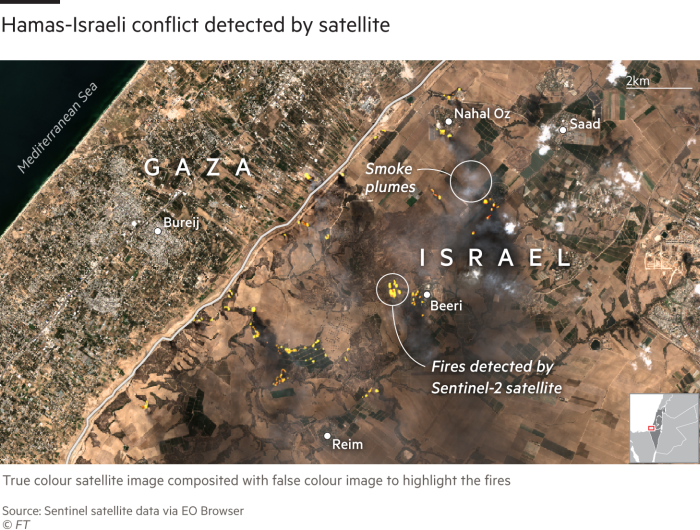Stay informed with free updates
Simply sign up to the Israeli-Palestinian conflict myFT Digest — delivered directly to your inbox.
The death toll in Hamas’s unprecedented multi-faceted attack on Israel has topped 600 as the country’s forces continue to wage gun battles with Palestinian militants who have taken 100 Israelis hostage.
The rapidly rising body count makes it the biggest single attack inside Israel’s borders since the nation was founded in 1948.
Benjamin Netanyahu, the prime minister, has warned that Israel faces a “long and difficult war” after the assault, which was launched by Hamas militants from the Gaza Strip on Saturday and stunned the country.
Israel’s government press office said that more than 600 people had been killed in Israel and more than 2,000 injured after hundreds of militants on paragliders, motorbikes and boats stormed into the country from the Gaza Strip in a surprise attack. Around 100 have been taken hostage.
Officials in Gaza said that 370 people had been killed by Israeli strikes on the coastal enclave and that 2,200 had been wounded.

Israel responded with a huge bombardment of Gaza which continued overnight, levelling multistorey buildings, as well as hitting targets in Lebanon after the Iran-backed Hizbollah militant group fired mortars towards Israel.
Israel also cut off the supply of electricity, fuel and goods to Gaza, which it and Egypt have subjected to a crippling economic blockade since Hamas took control in 2007.
Speaking after a meeting of the Israeli security cabinet on Sunday, Netanyahu said Israeli forces had destroyed the “vast majority of the enemy forces that infiltrated our territory”, and that it had now begun the “offensive phase”.
“[This] will continue with neither limitations nor respite until the objectives are achieved,” the prime minister said.

However, on Sunday morning, 24 hours after the attack began, Israeli forces were still battling militants, and an official said fighting was continuing in eight places in Israel, including at a military base in Zikim.
Hamas said its gunmen were still engaged in clashes in several areas in Israel and were being supported by rocket fire.
In a sign of the potential for the conflict to spiral into a regional conflagration, Israel’s military said its artillery had also struck areas in Lebanon after Hizbollah said it had fired mortars towards Israel “in solidarity” with the Palestinian people.
Richard Hecht, a spokesperson for Israel’s armed forces, said the military was looking into the incident but that it had not been an “all out” attack from Lebanon, and urged Hizbollah, which has a strong presence in southern Lebanon, not to enter the fighting. “I don’t think they will. But if they do, we are ready,” he said.
Saturday’s attack, which was launched on the Jewish holiday of Simchat Torah and caught Israel’s military off-guard, poses a serious challenge for Netanyahu’s far-right government, which came to power last year with hardliners in important posts pledging to bolster security.

“[Saturday was] one of the most difficult days in our history,” said Zvika Haimovich, former commander of the Israel Air Defense Forces.
“There is no question this was well planned for many, many weeks if not more, well co-ordinated between the terrorist organisations in Gaza — and in my assumption not only in Gaza. I would not be surprised if [Hizbollah and the Iranians] were involved as well,” he said.
Despite the outrage in Israel at the security failures, there were signs of the main political parties closing ranks, with Netanyahu and the leaders of the two largest opposition parties, Yair Lapid and Benny Gantz, discussing forming a unity government for the duration of the conflict, which would focus narrowly on security issues.
Israeli officials said militants in Gaza had fired more than 3,500 rockets at Israel during their initial barrage on Saturday, but that most casualties had been caused by close combat and “executions” by Hamas militants.
The UN Security Council was due to meet later on Sunday amid international efforts to de-escalate the conflict.
The secretary-general António Guterres, condemned the attack by Hamas and urged “all diplomatic efforts to avoid a wider conflagration”, while the UN peacekeeping force had been deployed along Israel’s border with Lebanon to “maintain stability and help avoid escalation”.
Additional reporting by Samer al-Atrush


































































:quality(85):upscale()/2023/10/06/816/n/1922564/7c111db6652053a6a12ba8.34402748_.jpg)














